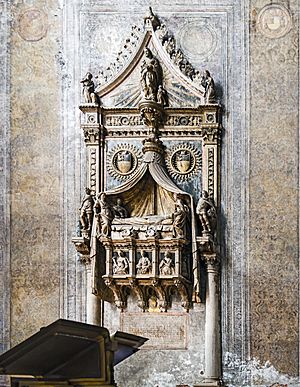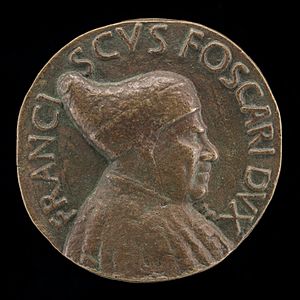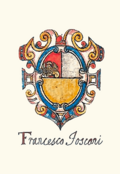Francesco Foscari facts for kids
Quick facts for kids Francesco Foscari |
|
|---|---|
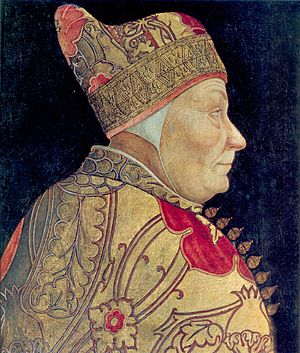
Portrait by Lazzaro Bastiani
(Museo Correr, Venice). |
|
| Reign | 15 April 1423 – 22 October 1457 |
| Predecessor | Tommaso Mocenigo |
| Successor | Pasquale Malipiero |
| Born | 19 June 1373 Venice, Venetian Republic |
| Died | 1 November 1457 (aged 84) Santa Margherita, Venice, Venetian Republic |
| Burial | Santa Maria Gloriosa dei Frari, Venice |
| House | Foscari |
Francesco Foscari (born June 19, 1373 – died November 1, 1457) was a very important leader in the Republic of Venice. He was the 65th Doge of Venice, serving from 1423 to 1457. His time as Doge was the longest in Venetian history, lasting over 34 years. This period was also when the Italian Renaissance began.
Contents
Becoming a Leader in Venice
Francesco Foscari was born in 1373. He was the oldest son of Nicolò Foscari and Cateruzia Michiel. The Foscari family was not super famous at first. However, they became one of the few noble families to get a permanent spot in the Great Council of Venice. This happened after a special event called the Serrata (meaning "Closing") of the Great Council. After this, the family started to become more important in the 1300s. Francesco's family members began to hold high government jobs. His father, Nicolò, even joined the powerful Council of Ten.
Francesco worked for the Republic of Venice in many important roles. He was an ambassador, a leader in the Council of Forty, and a member of the Council of Ten. He also served as an inquisitor and a Procurator of St Mark's. In 1423, he was chosen as Doge, beating another candidate named Pietro Loredan.
Leading Venice Through Wars
As Doge, Francesco Foscari had a big job. He had to lead Venice in many long wars against Milan. Milan was ruled by the Visconti family, who wanted to control all of northern Italy. Even though Venice won some battles, these wars were very expensive. Venice's main wealth and power came from the sea, not from fighting on land.
During these wars, Venice stopped being allies with Florence. Eventually, Milan's army, led by Francesco Sforza, defeated Venice. However, Sforza soon made peace with Florence, leaving Venice to face Milan alone.
Family Life and Challenges
Francesco Foscari was married twice. First, he married Maria Priuli, and then in 1415, he married Marina Nani. He had a son named Jacopo, who was his only child to survive.
In 1445, Jacopo faced serious problems. The Council of Ten investigated him for wrongdoing and sent him away from Venice. He faced two more investigations in 1450 and 1456. During the last one, he admitted to asking for help from Venice's enemies. Because of this, Jacopo was sent to prison on the island of Crete. He died there soon after.
When Francesco Foscari heard about his son Jacopo's death, he became very sad. He stopped doing his duties as Doge. In October 1457, the Council of Ten decided that he had to step down from his position. He died just one week later. People in Venice were very upset about his death, and he was given a grand state funeral.
Art and Legacy
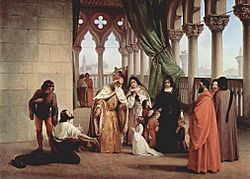
Many artists created works inspired by Francesco Foscari. There is a portrait of him by Lazzaro Bastiani. He also asked the famous artist Donatello to make a bronze plaque of him. A statue of Foscari kneeling in prayer used to be over the entrance to the Doge's Palace. His tomb, created by the sculptor Antonio Bregno, is in the church of Santa Maria dei Frari in Venice.
In Books and Plays
Francesco Foscari's life has been featured in many stories and operas.
- Lord Byron wrote a play called The Two Foscari in 1821.
- This play was later used for the story of Giuseppe Verdi's opera I due Foscari, which first showed in Rome in 1844.
- Mary Mitford, a famous writer, also wrote a successful play about Foscari's life called Foscari. It opened in 1826.
See also
 In Spanish: Francesco Foscari para niños
In Spanish: Francesco Foscari para niños
- Ca' Foscari, a palace built by Francesco Foscari on the Grand Canal.
 | Charles R. Drew |
 | Benjamin Banneker |
 | Jane C. Wright |
 | Roger Arliner Young |


